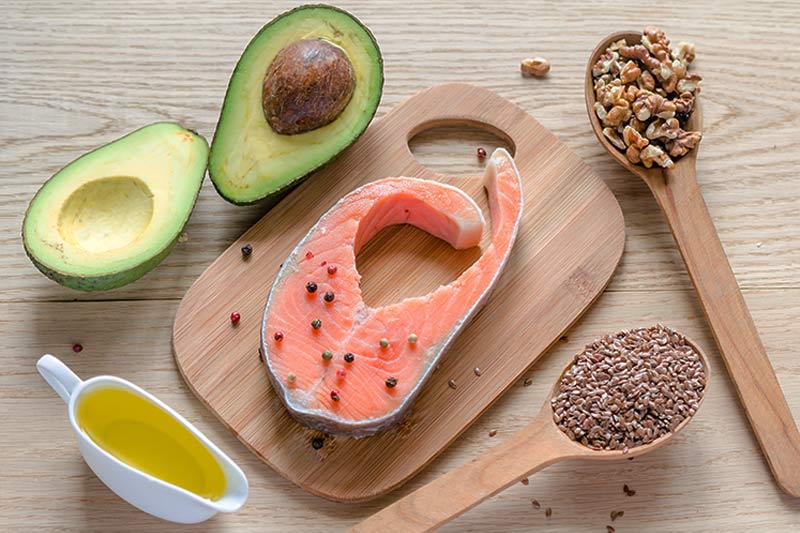Fatty acids are the primary components of fats in food and our bodies. They are key players in various bodily functions, including energy metabolism, cell membrane function, hormone regulation, and preserving the skin’s protective barrier. A compromised lipid barrier can lead to various skin problems, including atopic dermatitis, psoriasis, acne, and eczema.
This article focuses on the effects of fatty acids on the skin and provides tips on how to use them to maintain a healthy, youthful complexion.

What Are Omega Fatty Acids?
Omega fatty acids are unsaturated fatty acids consisting of a long chain of carbon and hydrogen atoms and one or more double bonds between carbon atoms. The name comes from their chemical structure, where “omega” refers to the tail end of the molecular chain, and the number refers to the position of the double bond from the chain’s end.
Omegas with only one double bond are called monounsaturated, or MUFAs, and they include omega-7 and omega-9. Omegas with more than one double bond are called polyunsaturated, or PUFAs, and include omega-3 and omega-6.
Double bonds cause omega fatty acids to become liquid at room temperature. Saturated fats remain solid.
Types of Fatty Acids Used in Skin Care
Omegas are the most used fatty acids in skin care, though many skincare products also contain certain non-omega fatty acids due to their emollient properties. These include palmitic and stearic acids, caprylic and capric triglycerides, etc.
Omega fatty acids include omega-3, omega-6, omega-7, and omega-9 fats. Omega-3 and omega-6 are essential fatty acids, which means our bodies can’t produce them, so we need to obtain them through food. Non-essential omegas can be synthesized by the body or derived from essential omega fatty acids.
Omega-3
This is perhaps the most common fatty acid in skin care. It has anti-inflammatory properties, helping to relieve dry, irritated skin and strengthen the skin’s lipid barrier.
Three common omega-3s include:
- Alpha-linoleic acid (ALA)
- Eicosapentaenoic acid (EPA)
- Docosahexaenoic (DHA)
Omega-6
Omega-6 has similar benefits for the skin as omega-3, improving the skin’s ability to retain moisture and reducing inflammation. Linoleic and arachidonic acids are the predominant omega-6 fatty acids.
Omega-7
Omega-7 is a lesser-known group of monounsaturated fats that hasn’t been widely researched. Palmitoleic acid is the prevalent omega-7 fatty acid. It is suitable for dry, chapped skin as it maintains hydration, improves elasticity, and helps wound healing.
Omega-9
Omega-9 is a non-essential, monounsaturated fatty acid, mostly used in skin care as oleic acid. It is suitable for dry, flaky skin because it maintains hydration, softens skin, and improves elasticity.
Benefits of Fatty Acids for the Skin

Omega fatty acids, especially omega-3s and omega-6s, have the most beneficial effects on the skin’s health. Though clinical data is limited, research points to these compounds’ anti-inflammatory and antibacterial properties, which strengthen the skin’s barrier and improve moisture retention.
Well-hydrated skin and a stronger epidermis help reduce various cosmetic concerns, including inflammation and signs of aging skin resulting from UV damage.
The potential benefits of using omega fatty acids in skin care include:
- Reduced dryness
- Decreased appearance of wrinkles
- Softer and smoother skin
- Improved elasticity
- Reduced photodamage
- Faded scarring
- Reduced acne
Note: Learn more about the benefits of omega-3s for the skin and how they help alleviate aging signs.
Risks and Side Effects of Fatty Acids for the Skin
Fatty acids make up a significant portion of the skin barrier’s lipids. Replenishing them to address issues due to their deficiency is safe and well tolerated by most adults.
Potential risks include allergic reactions to fatty acid supplements and botanical ingredients in facial creams and oils. People with sensitive skin are particularly prone to irritations after using plant oils, especially those containing saturated oils and linoleic (omega-6) acid.
Potential side effects from using topical products with fatty acids include:
- Itching
- Redness
- Rashes
Many plant oils are highly comedogenic (pore-clogging), so people with combination, oily, and acne-prone skin may experience more breakouts.
Potential side effects of fatty acid supplements are benign and include the following:
- Fishy taste
- Diarrhea
- Gas
- Upset stomach
- Nausea
- Belching
How to Use Fatty Acids
Lipids, including fatty acids, are one of the main components of the skin’s outer layer. Their deficiency usually leads to impaired skin health due to increased transepidermal water loss.
Clinical studies and patient experience suggest that supplementing fatty acids orally or topically may offer a solution for issues related to dry and compromised skin.
The following are the best products and food sources of fatty acids to try.
Skincare Products with Fatty Acids
Alpha-linoleic (omega-3) and linoleic (omega-6) in skincare products provide the most benefits to skin. They may be used in creams with other moisturizing ingredients, such as hyaluronic acid, ceramides, and squalane, because they increase the absorption of other ingredients.
They can also be used as pure essential oils. Some of the most common include:
- Safflower oil (omega-6)
- Sunflower oil (omega-6 and omega-9)
- Rosehip oil (omega-3 and omega-6)
- Primrose oil (omega-6)
- Avocado oil (omega-6 and omega-9)
- Olive oil (omega-9)
- Argan oil (omega-6 and omega-9)
- Grape seed oil (omega-6)
The effectiveness of a botanical oil depends on the ratio of fatty acids present. A knowledgeable cosmetic professional will recommend an effective skincare product based on the patient’s skin type and concern.
Our skin experts at Vibrant Skin Bar highly regard Nourish Avocado Facial Oil by Osmosis MD for its rich fatty acid (omega-3 and omega-6) content, including fatty acids from avocado, olive, sunflower, jojoba, and other natural oils. Its careful formulation and fatty acids ratio deliver the ingredients’ emollient properties while minimizing their comedogenic effects.
Note: Learn more about how avocado oil for skin helps reveal a tighter, smoother, and younger-looking complexion.
Dietary Sources of Fatty Acids

Food is the primary source of omega fatty acids, contributing to the epidermal lipid pool and skin health. People who maintain a healthy diet typically don’t need topical products with essential oils.
Dietary omega-3s and omega-6s are abundant in these foods:
- Oily cold-water fish (salmon, mackerel, tuna, herring)
- Fish, cod, and krill oils
- Vegetable oils (safflower, grapeseed, sunflower, soybean, sesame, olive, flaxseed, etc.)
- Leafy greens (Brussels sprouts, kale, spinach, broccoli)
- Nuts and seeds (macadamia nuts, walnuts, flaxseed, chia seeds, etc.)
However, it is important to watch the ratio of omega-3s and omega-6s in food. Historically, people’s diets consisted of foods that had a relatively balanced ratio of omega-6 to omega-3 fatty acid, which was close to 1:1 and beneficial for overall health. Today, the Western diet is dominated by processed foods and vegetable oils, skewing the healthy omegas’ ratio to 20:1 in favor of omega-6. This leads to pro-inflammatory health problems, including skin conditions like psoriasis and eczema.
To ensure a healthy ratio of 1:1 to 4:1, replace refined cooking oils with olive, avocado, and coconut oil, reduce the intake of processed foods, and consume more fatty fish, nuts, and seeds.
People who struggle to eat healthily can benefit from incorporating omega supplements into their routine. Fish oil is probably the most well-known source of supplementary omega fats. It is a good source of omega-3s, but Vibrant Omegas is a better choice for people who want to get a good ratio of omega-3s and omega-6s. This supplement hydrates the skin, reduces inflammation, and improves overall health.
Another favorite at Vibrant Skin Bar, Recovery by Osmosis MD, is a rich omega-7 elixir formulated to address facial volume loss, reduce skin inflammation, and strengthen the skin’s antioxidant protection. It is a great solution for aging skin and rosacea.
Conclusion
Fatty acids are essential nutrients responsible for healthy skin function and appearance. Skin experts still debate their beneficial effects in skincare products and dietary supplements. However, it is generally accepted that omegas help repair the skin’s protective barrier and improve various skin concerns.
Note that there is no evidence that adding fatty acids to a diet or skincare regimen can help resolve skin issues in people who are not deficient in essential fatty acids.
Consult a trusted cosmetic and medical professional to evaluate your skin and health status and determine if supplements and topical products with fatty acids are right for you.


